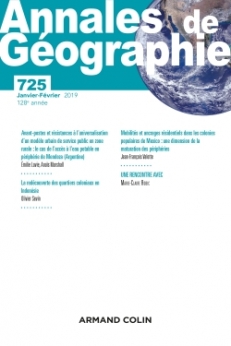
Annales de géographie - n°725 (1/2019)
Pour acheter ce numéro, contactez-nous
Recevez les numéros de l'année en cours et accédez à l'intégralité des articles en ligne.
Mendoza, quatrième pôle urbain d’Argentine, présente un paysage de l’eau potable marqué par une fracture entre un centre bien connecté par un réseau général, et une périphérie en archipels de réseaux et d’initiatives privées. Alors que le service public urbain central a été renationalisé après quinze années de partenariat-public-privé, la volonté d’universaliser le modèle qui allait de pair avec la privatisation, se poursuit en périphéries de la ville. Pour autant, si le souhait d’un réseau et d’une gouvernance uniformes à l’échelle de l’agglomération persiste, le système technique évolue en périphérie, privilégiant les micro-réseaux à l’extension du réseau central. Cet article étudie les avant-postes et les poches de résistance à l’universalisation du modèle urbain, dans deux secteurs ruraux en cours d’urbanisation : Los Corralitos et Colonia Molina (municipalité de Guaymallén). Il met aussi en avant le rôle de la qualité de l’eau dans cette fragmentation du paysage de l’eau domestique.
Mendoza, the fourth largest City in Argentina, has a double-sided system of drinking-water provision : a centre well connected to a general supply network, and a periphery marked by an archipelago of networks and private initiatives. While the urban public services network has been renationalized, after fifteen yearsofpublic-private-partnership, the desire to universalize the pattern developed under privatization, persists. However, although at the agglomeration scale, there is a will to establish uniform networks and management, at the periphery the technical system is evolving, encouraging the development of micro-networks rather than the expansion of the central one. This article analyses some of outposts and pockets of resistance to the universalization of an urban-model, in two rural districts experiencing urbanization : Los Corralitos and Colonia Molina (Municipality of Guaymallén). It also highlights the role of water quality in the fragmentation of the overall domestic water-supply system.